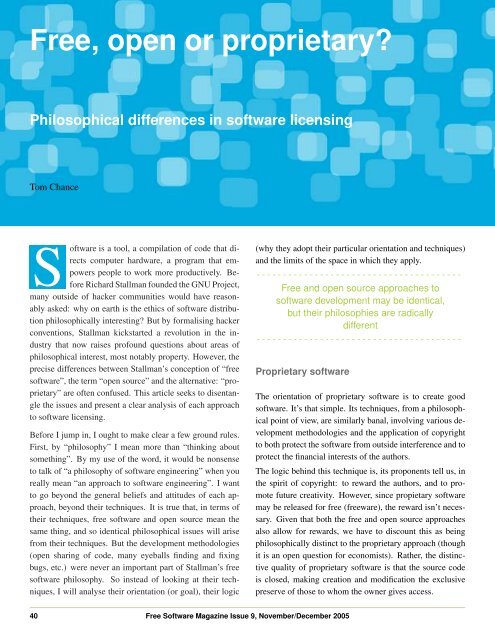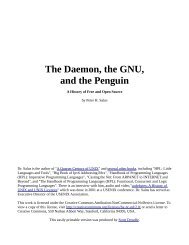ISSN 1746-8752 - depo.osn.ro
ISSN 1746-8752 - depo.osn.ro
ISSN 1746-8752 - depo.osn.ro
Create successful ePaper yourself
Turn your PDF publications into a flip-book with our unique Google optimized e-Paper software.
Free, open or p<strong>ro</strong>prietary?<br />
Philosophical differences in software licensing<br />
Tom Chance<br />
Software is a tool, a compilation of code that directs<br />
computer hardware, a p<strong>ro</strong>gram that empowers<br />
people to work more p<strong>ro</strong>ductively. Before<br />
Richard Stallman founded the GNU P<strong>ro</strong>ject,<br />
many outside of hacker communities would have reasonably<br />
asked: why on earth is the ethics of software distribution<br />
philosophically interesting? But by formalising hacker<br />
conventions, Stallman kickstarted a revolution in the industry<br />
that now raises p<strong>ro</strong>found questions about areas of<br />
philosophical interest, most notably p<strong>ro</strong>perty. However, the<br />
precise differences between Stallman’s conception of “free<br />
software”, the term “open source” and the alternative: “p<strong>ro</strong>prietary”<br />
are often confused. This article seeks to disentangle<br />
the issues and present a clear analysis of each app<strong>ro</strong>ach<br />
to software licensing.<br />
Before I jump in, I ought to make clear a few g<strong>ro</strong>und rules.<br />
First, by “philosophy” I mean more than “thinking about<br />
something”. By my use of the word, it would be nonsense<br />
to talk of “a philosophy of software engineering” when you<br />
really mean “an app<strong>ro</strong>ach to software engineering”. I want<br />
to go beyond the general beliefs and attitudes of each app<strong>ro</strong>ach,<br />
beyond their techniques. It is true that, in terms of<br />
their techniques, free software and open source mean the<br />
same thing, and so identical philosophical issues will arise<br />
f<strong>ro</strong>m their techniques. But the development methodologies<br />
(open sharing of code, many eyeballs finding and fixing<br />
bugs, etc.) were never an important part of Stallman’s free<br />
software philosophy. So instead of looking at their techniques,<br />
I will analyse their orientation (or goal), their logic<br />
(why they adopt their particular orientation and techniques)<br />
and the limits of the space in which they apply.<br />
- - - - - - - - - - - - - - - - - - - - - - - - - - - - - - - - - - - - - - -<br />
Free and open source app<strong>ro</strong>aches to<br />
software development may be identical,<br />
but their philosophies are radically<br />
different<br />
- - - - - - - - - - - - - - - - - - - - - - - - - - - - - - - - - - - - - - -<br />
P<strong>ro</strong>prietary software<br />
40 Free Software Magazine Issue 9, November/December 2005<br />
The orientation of p<strong>ro</strong>prietary software is to create good<br />
software. It’s that simple. Its techniques, f<strong>ro</strong>m a philosophical<br />
point of view, are similarly banal, involving various development<br />
methodologies and the application of copyright<br />
to both p<strong>ro</strong>tect the software f<strong>ro</strong>m outside interference and to<br />
p<strong>ro</strong>tect the financial interests of the authors.<br />
The logic behind this technique is, its p<strong>ro</strong>ponents tell us, in<br />
the spirit of copyright: to reward the authors, and to p<strong>ro</strong>mote<br />
future creativity. However, since p<strong>ro</strong>pietary software<br />
may be released for free (freeware), the reward isn’t necessary.<br />
Given that both the free and open source app<strong>ro</strong>aches<br />
also allow for rewards, we have to discount this as being<br />
philosophically distinct to the p<strong>ro</strong>prietary app<strong>ro</strong>ach (though<br />
it is an open question for economists). Rather, the distinctive<br />
quality of p<strong>ro</strong>prietary software is that the source code<br />
is closed, making creation and modification the exclusive<br />
preserve of those to whom the owner gives access.



